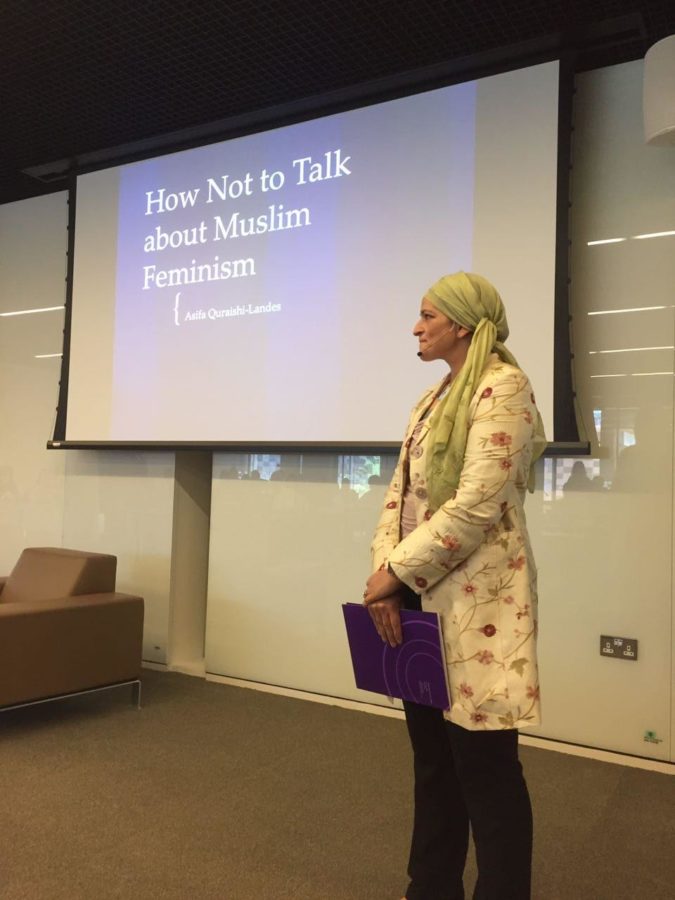NU-Q Speaker discusses “How not to talk about Muslim Feminism”
Despite global misconceptions, feminism and Islamic principles are not at odds with each other, according to Asifa Quraishi-Landes, Ph.D., who spoke at Northwestern University in Qatar on March 22.
Quraishi-Landes was invited as part of a series of interdisciplinary talks held for the newly-introduced Middle Eastern Studies Minor at NU-Q. President of the National Association of Muslim Lawyers in the United States, Quraishi-Landes also serves on the board of the Association of American Law Schools’ Section on Islamic Law and is a professor at the University of Wisconsin-Madison, where she teaches comparative Islamic and U.S. constitutional law. Her discussion was centered around the goal of women’s empowerment from within Muslim society.
Quraishi-Landes stated there must be more nuanced advocacy when it comes to women’s rights that does not paralyze Muslim feminism. She argued that Islamic Sharia Law, or Fiqh, and feminism are not mutually exclusive ideas, and that advocacy for women’s rights has been most successful when the conversation comes from within a Muslim society. Western feminists should stop believing in the false dichotomy that they can either be for Islam or for women but not both, Quraishi-Landes said. Instead, those who want to truly bring a positive change into the lives of oppressed women must take a more “Sharia mindful approach.”
According to her, in mainstream Western mindsets, Sharia is placed as an obstacle towards women’s rights, but it can in fact be a tool of empowerment. When taught Sharia and Islamic law, women would have power to understand and interpret the laws, thereby preventing men from making false and oppressive interpretations of Sharia. Quraishi-Landes used the case of Safiya Hussaini Tungar-Tudu as an example of such patriarchal interpretation; the Nigerian woman was sentenced to death for zina, or unlawful sexual intercourse, in late 2001 despite national and international outcry. Quraishi-Landes went on to emphasize the importance of self-advocacy from Muslim communities as well.
Jocelyn Mitchell, an assistant professor of political science at NU-Q, welcomed the arguments that Quraishi-Landes brought to the table, “I appreciated her point about how a lot of well-intentioned Western or human rights advocacy can backfire if not couched in the correct kinds of cultural sensitivity.”
Quraishi-Landes explained that women were given rights prior to the emergence of Western feminism and many in the Muslim community fail to trace women’s rights to the early Islamic era and Sharia law. While they were not formal feminist movements, early reforms under Islam forbade female infanticide, recognized women as full persons and gave women inheritance rights, making enormous progress before the emergence of Western feminism.
Asmaa Benkermi, a communication sophomore, said Quraishi-Landes raised an important point about the association of feminism with the West. “She argues the feminism was incorporated in Islam way before it was a Western concept, which made me re-evaluate the whole idea of feminism,” Benkermi said.
Quraishi-Landes also spoke about ‘Zara Sochiye,’ a Pakistani talk show that brought the conversation about certain Islamic laws to the general public in Pakistan, which led to rape being excluded from the list of activities that constituted zina. Professor Mitchell said she valued this idea of taking political discourse to a medium that is more accessible to the general public: “I also appreciated her example of the TV show that created the space for a new dialogue about the law. I think that is something very inspiring, especially for our students here who do journalism and communication.”
After the talk, the speaker also led an informal discussion about women and Islam with the NU-Q student-run club Ambassadors of Peace. They discussed topics such as the challenges linked to feminism in Muslim communities, the role of men in supporting women’s rights, and her personal experiences with the struggle for women’s rights.













